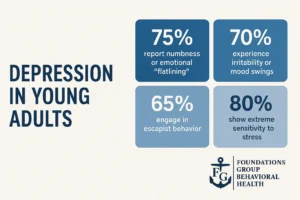It’s hard to describe the heartbreak of watching your child take steps forward—only to fall back again. One day they seem okay. They’re making it to class. They text you back. They’re even smiling. Then the next? They’re missing calls, isolating again, maybe even turning to old coping mechanisms you thought were behind them.
If your young adult keeps slipping into self-destructive or avoidant behaviors, it’s normal to feel confused, defeated, or even angry. But it doesn’t mean they’re hopeless. And it doesn’t mean you’ve failed.
In many cases, these recurring patterns aren’t simply choices—they’re symptoms. And Depressive Disorder Treatment may be the key to helping your young adult get unstuck, especially if they’re trapped in a loop they don’t fully understand.
Explore our Depressive Disorder Treatment program to learn how we support young adults and families facing exactly this kind of exhaustion.
The Behaviors Are Only the Surface
When your child keeps:
- Sleeping all day
- Skipping classes or quitting jobs
- Avoiding responsibilities
- Disconnecting from friends and family
- Turning to substances or technology to cope
…it can be easy to label them as lazy or unmotivated. But these patterns are often signs of something deeper.
In depressive disorder, what looks like “not trying” is often “can’t try.” Executive function breaks down. Motivation disappears. Emotional regulation short-circuits. And without treatment, even the most supported young adults can end up stuck in a loop of guilt, isolation, and shame.
Why Your 20-Something May Not Realize They’re Depressed
Many young adults don’t recognize depressive symptoms for what they are—especially if they don’t feel “sad” all the time. Depression can show up in surprising ways:
- Numbness or emotional flatlining
- Irritability and mood swings
- Escapist behavior (endless scrolling, substance use, hyper-isolation)
- Extreme sensitivity to stress or criticism
- A deep sense of shame or worthlessness
When your child says “I don’t know what’s wrong with me,” they might mean it. And even if they suspect depression, they may be afraid to say it out loud—especially if they’ve tried treatment before and didn’t find it helpful.
This is where tailored, age-appropriate treatment makes a difference.
What Makes Depressive Disorder Treatment Different at Foundations Group
At Foundations Group Behavioral Health, our approach to Depressive Disorder Treatment in Barnstable County, MA is designed with your child’s age, stage, and complexity in mind.
Here’s what sets us apart:
1. We Focus on the “Why,” Not Just the Symptoms
We don’t just manage surface behaviors—we dig into what’s driving them. Depression in young adults is often layered with academic pressure, identity confusion, social isolation, and undiagnosed anxiety.
Through clinical assessments and collaborative treatment planning, we help your child uncover root causes—not just mask the signs.
2. Therapy That Speaks Their Language
Talk therapy only works when the client feels safe and understood. That’s why our clinicians specialize in working with emerging adults. We avoid jargon, respect their autonomy, and build genuine rapport—because healing only happens when trust is present.
3. Treatment That Fits Real Life
Many young adults have tried therapy or counseling before, but felt it didn’t “do enough.” Our depressive disorder treatment programs offer a more immersive and integrated model that can include:
- Individual and group therapy
- Behavioral activation and skill-building
- Medication support, if appropriate
- Psychoeducation for families
- Flexible outpatient options for those balancing school or work
We work with you and your child to create a care plan that meets them where they are—without overwhelming or infantilizing them.
The “Backslide” Doesn’t Mean They Don’t Want Help
This is one of the hardest truths to accept as a parent: your child can want to get better and still fall backward. Depression doesn’t respond to logic or guilt. It wears down the will. It tells them they’re a burden, a failure, a disappointment.
What looks like defiance is often despair in disguise.
Treatment isn’t just about behavior modification—it’s about reconnecting your child to hope. To a version of themselves they can believe in again. And you don’t have to figure out how to get them there alone.
If you’re in Falmouth, MA, our depressive disorder treatment team is available to support both your young adult and you as a parent navigating the unknown.
The Parent Role: Guiding Without Pushing
You’ve probably already tried every strategy: encouragement, boundaries, ultimatums, pleading, silence. It’s exhausting.
What helps most at this stage is moving from “fixer” to “facilitator.” You don’t have to solve it. But you can point toward help. That might look like:
- Saying, “You don’t have to explain everything. But I can tell something isn’t right, and I think talking to someone could help.”
- Offering options gently: “I found a place that works with people your age. No pressure—but I’ll send you the link.”
- Acknowledging the fear: “I know last time you tried therapy, it wasn’t great. This would be different.”
The key is staying open—and reminding them that help is available even if they’ve slipped, even if they’re scared, even if they’re tired.
What Recovery Can Look Like (It’s Not Always What You Think)
Progress in depressive disorder treatment doesn’t always look like immediate change. Sometimes it’s subtle:
- They show up to sessions—even when they don’t say much
- They start showering again regularly
- They go a week without numbing out
- They text you back with something other than “I’m fine”
These small signs matter. They’re indicators that the fog is starting to lift—and that your child is slowly returning to themselves.
Frequently Asked Questions
What if my child refuses to go to treatment?
Resistance is common, especially when depression is untreated. Focus on expressing concern, not control. You can plant the seed, provide the info, and keep the door open. Often, just knowing you’re not giving up helps them consider saying yes later.
Can depressive disorder be treated alongside substance use?
Yes. Many young adults use substances to self-medicate untreated depression. Our team is experienced in working with co-occurring disorders, addressing both the mood symptoms and the behaviors in an integrated way.
Is treatment available if my child is working or in school?
Absolutely. We offer outpatient options that can be scheduled around work or academic commitments. Treatment should support—not disrupt—their stability.
What’s different about depressive disorder treatment versus regular therapy?
Depressive disorder treatment is more structured and comprehensive. It’s focused on identifying underlying depressive patterns and offering targeted interventions, coping strategies, and sometimes medical support. Regular therapy may be too general or inconsistent for deeper depressive symptoms.
Can I be involved as a parent?
Yes. With your child’s consent, we offer parent check-ins, family education, and collaborative planning. We also respect your child’s privacy and independence, creating a balance that builds trust on all sides.
Is there help near me?
Yes. If you’re in Cape Cod, you can access Depressive Disorder Treatment in Barnstable County or Falmouth, MA through Foundations Group Behavioral Health. Our care is tailored for this region, and we understand the unique pressures local families face.
Take the Next Step—Without Taking It Alone
If your young adult keeps falling back into old habits, depressive disorder treatment could be the missing piece. And you don’t have to figure it out alone.
Call 888-685-9730 or visit our Depressive Disorder Treatment program to learn more about services in Cape Cod, MA. This time, the step forward could actually stick.









